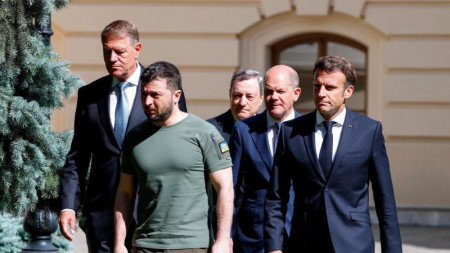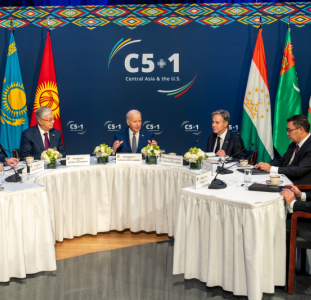
"Zelensky’s star power fades on Capitol Hill… Ukraine’s president receives a quieter welcome in Washington," US broadsheet The New York Times writes. The outlet has come up with conclusions of the kind after analyzing results of his visit to the United States. His reception of September 26 was a lot more modest than a year ago — several dozen lawmakers attended the meeting behind closed doors, and the House Speaker dropped out altogether. Still, Zelensky got a booby pay-out prize accounting for $5.5bn in remaining tranches, although with no progress on approving new ones.
Therefore, as agreed in the course of Joe Biden's latest visit to Europe, the EU leadership is getting ready to take over Ukraine maintenance, despite its own budget crisis. As the Financial Times reported on September 17 citing three European officials, “the EU is preparing to provide up to €40bn in new loans for Ukraine by the end of the year regardless of US participation.” Now this plan is considered as an apex to the basic scheme approved in June by G7 to provide Kiev with a $50bn loan using profits on frozen Russian assets. The final amount of credit will be determined following European Commission’s consultations with the member states. The engagement of such a mechanism has been brought about by the fact that its adoption requires majority support, and Budapest is unable to use its right of veto.
Let’s note that during the war in Ukraine, the European Union and its members have allocated a total of $118.3bn to Kiev, with further funds running into resolute opposition in a number of European countries. It can't continue this way, Hungarian Prime Minister Viktor Orban believes. In fact, the Ukrainian economy is solely supported by Western injections and can be hardly considered financially viable, he told radio Kossuth the other day.
But despite all the objections, Brussels has assured Kiev that it will keep meeting Ukraine’s urgent military and defense needs (earlier in February, EU leaders agreed on a 50-billion-euro aid program for Ukraine in 2024 to 2027. Two thirds of the amount will be provided in loans, and the remaining €17 billion are going to be grants deducted from the EU budget).
Notably, most EU countries are also ready to finance Ukraine to the bitter end, although in word alone, while in practice their contributions are greatly different. Thus, since the beginning of the conflict, Kiev has obtained €17.1bn from Germany, €3bn from Poland, €690mln from Italy, €540mln from France as the second EU economy, and €340mln from Spain, as the Kiel Institute for the World Economy (IfW Kiel) found out. Hungary and Slovakia are both opposed to financing Ukraine and might be later joined by other countries as well. For example, Austrian Federal Chancellor Karl Nehammer said his country would not provide military support to Ukraine because of its neutral status.
This stance by European countries has several reasons behind it: the rising cost of the conflict, stagnation of economic growth in Europe accompanied by calls for a review of funds in 2024 to 2027, and growing popular discontent. Thus, opinion polls in Germany have been showing a steady rise of popularity of the Alternative for Germany party as people grow dissatisfied with current government policies. The key problem is the heating law promoted by the Greens, because many cannot simply afford what’s required. The public is also enraged with the fact that amid collapsing bridges, falling housing construction rates, dire state of roads, lack of medicines, and industrial companies’ withdrawal from the country, Olaf Scholz’s government has been raising costs of fostering migrants and spending money to help Ukraine, instead of overcoming the crisis.
In such a context, EU leaders fear that in the medium term they will be left with little room for maneuver to support Kiev, especially with US presidential candidate Donald Trump pledging a peaceful solution to the conflict even before he enters office, if declared winner in November. And this implies that US assistance flow may come to an end. Apart from that, the pro-Ukrainian front within the European Union is wary of potential threats associated with EP far right growing stronger in 2024. Political analyst and journalist Hussein al-Waeli believes that if they win in Europe’s engine states like France or Germany, reduction of funds for Ukraine will be just around the corner. The advance of Russian troops that have been taking control of settlement after settlement, also has a negative effect on sentiment observed among Western politicians. That is why the EC leadership is in such a haste to resolve the issue of financing Kiev.
All of those things have occurred amid Europe’s higher fears that the United States withdraws from the Ukrainian project with certain profits, if at all, which is quite consistent with its economic interests, as Washington’s strategy has been clearly aimed to weaken European competitors by separating them from Russia, and vice versa. And it has been successfully handling the task so far. Meanwhile, Europe, to top it all, will get a piece of Ukraine to maintain — poor, exhausted and frustrated. According to World Bank estimates, over €380bn are now needed for its restoration alone, not to mention increased defense spending, which the Europeans used to save on, to build a new life against the realm of a forfeiture wall in the east, instead of a huge market, great opportunities and energy stability. And yet, in order to maintain competitiveness at least at the existing level, Europe itself needs about $800bn, experts with Mario Draghi’s commission have estimated.
So, it turns out that Europe has been essentially fighting to serve other people's interests at its own expense. Meanwhile, according to a Financial Times analysis, “Europe’s biggest companies have suffered at least €100bn in direct losses from their operations in Russia… 176 companies have recorded asset impairments, foreign exchange-related charges and other one-off expenses as a result of the sale, closure or reduction of Russian businesses." But no business losses have prevented the EU leadership from continuing to shovel Ukraine with missiles, tanks and other military equipment. And this is only possible thanks to the undergrade present-day EU politicians, as evidenced by the new European Commission make-up.
Against this background, European countries started independently searching for ways to “divert funds from Ukraine to domestic needs,” Bloomberg wrote on September 30. Thus, the main donor Germany “is planning deep cuts in such aid in next year’s budget.”









